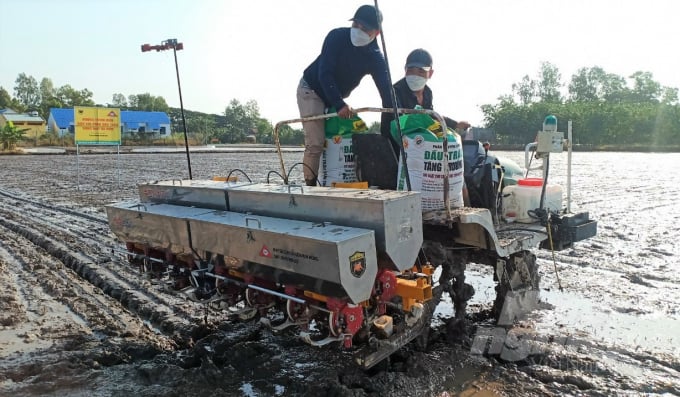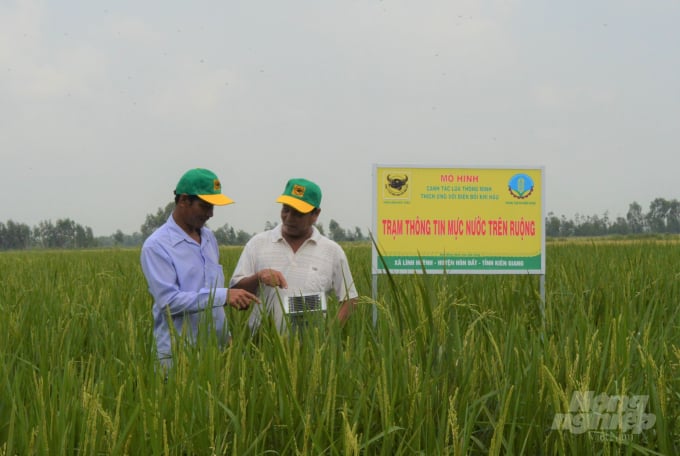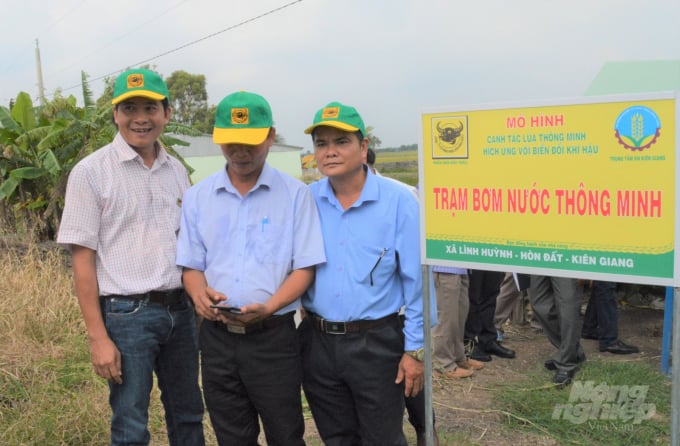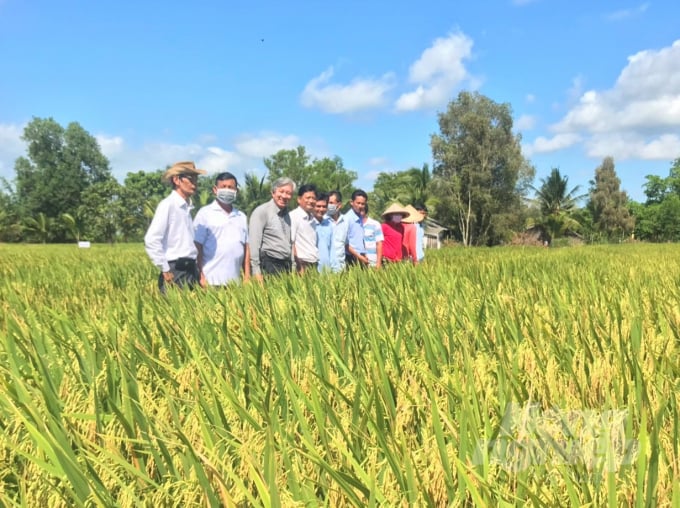May 19, 2025 | 15:54 GMT +7
May 19, 2025 | 15:54 GMT +7
Hotline: 0913.378.918
May 19, 2025 | 15:54 GMT +7
Hotline: 0913.378.918
Flipping the farming diary, Mr. Truong Van Hung, a farmer in Long Duc commune, Long Phu district, Soc Trang province, let me have a look at the expenses details of investment in his 0.5ha rice land in the 2021 - 2022 winter-spring crop. Everything from land tillage, seed purchase, transplanting process, water pumping, fertilizing, spraying, tending, harvesting, costs VND 8.8 million.
At the end of the crop, he gains 3.5 tons of commodity rice and has a company signed an underwriting contract for VND 7,850/kg. The total revenue nearly reaches VND 27.5 million. Minus investment costs, the profit is VND 18.6 million.
“If you follow this process correctly, with 1 ha of rice farmers will profit over VND 37 million. But this is already a dream-like profit to me. Because when I started to produce, the price of materials continuously increases at a rapid rate, making me worry that the costs will eat up all the profits and wonder whether it is not worth the risk.”

Farmers use cluster transplanters in combination with specialized fertilizers, helping rice plants thrive from the beginning with a reasonable density. Photo: Trung Chanh.
In this 2021 - 2022 winter-spring rice crop, Mr. Hung is one of the local households selected to participate in the implementation of the Climate-Smart Rice Production Program sponsored by Binh Dien Fertilizer Joint Stock Company. On an area of 1ha of land, Mr. Hung divided 0.5ha to participate in the implementation model and the other 0.5ha to farm following custom and personal experience as a comparison.
Participating in the model, Mr. Hung and other farmers receive training and synchronously apply advanced rice farming methods to production. They initiate the "1 must 5 decrease" (1P5G) process, planting sparsely at a density of 80 kg/ha of seed using seed sprayer, 30 - 50 kg/ha for transplanted rice, 40 - 60 kg/ha using cluster transplanter, instead of the custom of sowing from 140-200 kg of rice seed/ha. They also apply integrated pest management (IPM) to reduce the number of times they have to use pesticides.

The automatic water level sensor device helps smart rice farmers know exactly when to pump to irrigate rice, greatly saving water. Photo: Trung Chanh.
According to Mr. Hung, there are two main factors that helped him have a successful rice crop. One is to follow the smart rice production process as trained, so costs are lessened. The second factor is the ST25 rice variety with few pests and diseases, the caring takes little effort.
“The productivity may not be high, but in the context of high input prices, moderate investment is enough to attain a reasonable economic efficiency. The rice produced is underwritten by the company at a price higher than the market average of VND 550/kg, so a fair amount of profit is secured.”

Farmers can control the pumping station remotely via Internet-connected mobile devices, helping to take initiative in production. Photo: Trung Chanh.
Dr. Le Van Dung, Deputy Director of Kien Giang Agricultural Extension Center, assessed that the Climate-Smart Rice Farming Program that has been implemented in Kien Giang for many with very positive results. The program gathers great responses and participation from farmers, and the models were replicated on a large scale. In the 2021 - 2022 winter-spring crop this model continues to be deployed in 3 districts: Go Quao, Hon Dat and Giang Thanh.
As shared by Mr. Dung, in addition to focusing on training farmers on advanced rice farming techniques, the Climate-Smart Rice Production Program also supports the investment in smart equipment for more efficient production. For example, Binh Dien Fertilizer Joint Stock Company has sponsored automatic water monitoring equipment which transmits information regarding other devices connected to the Internet. This is a very useful device for coastal areas often invaded by saltwater. Farmers can know when to pump water into the field, reducing the potential risk of damage.
Water level sensors are installed in the smart rice production fields, helping farmers to be proactive in regulating water in accordance with the rice plants’ needs. The implemented model also applies alternating wet - dry irrigation procedures to save water, create favorable conditions for rice roots to thrive, prevent the plants from falling, and facilitate the harvest stage.
Another great method is the installation of smart devices to monitor the density of harmful insects in the field. Farmers can know exactly when to spray pesticides to protect rice plants, effectively reducing the number of spraying times per crop.

Thanks to participating in the Climate-Smart Rice Production Program, many farmers in the Mekong Delta have had a bountiful harvest while being able to minimize costs and maximize profits. Photo: Trung Chanh.
Translated by Samuel Pham

(VAN) 14 out of 35 domesticated elephants in Dak Lak province have had their living conditions improved, with 11 of them currently participating in the non-riding elephant tourism model.

(VAN) Muong Nhe Nature Reserve hopes that being upgraded to a national park will lay the foundation for forest protection efforts to be carried out in a systematic, modern, and sustainable manner.
/2025/05/16/3923-2-171845_52.jpg)
(VAN) Lower costs, higher yields, and improved soil quality are outstanding benefits that soybeans bring when integrated into the crop rotation system.

(VAN) The 'For a Green National Environment' programme aims to promote a green lifestyle, support businesses in implementing ESG practices, and turn Net Zero commitments into concrete actions.

(VAN) Cold-barn systems efficiently manage environmental and temperature conditions, which aids in the prevention of respiratory diseases in pigs and protects them from the vectors that transmit African swine fevers.

(VAN) To tackle challenges, the project 'Addressing key technical bottlenecks in the grouper supply chain in Vietnam' has been underway since 2024.

(VAN) The project 'Disease-Resilient and Sustainable Cassava Production Systems in the Mekong Region', funded by the Australian Center for International Agricultural Research (ACIAR), is being implemented from 2024 to 2028.